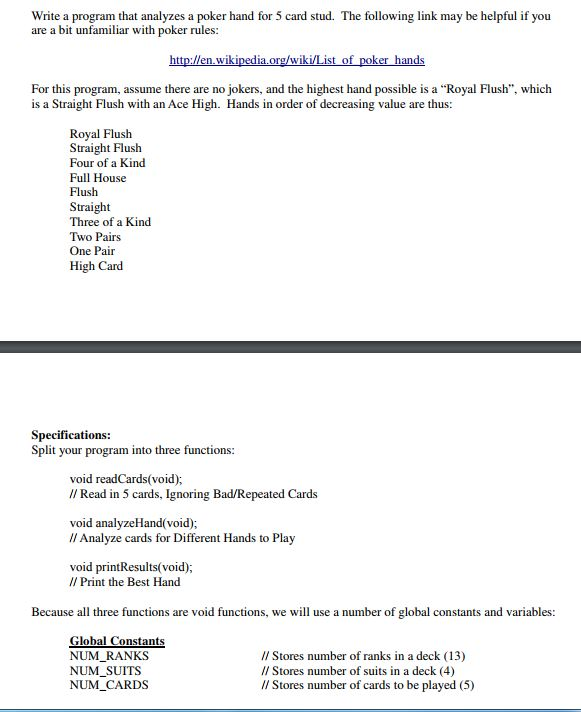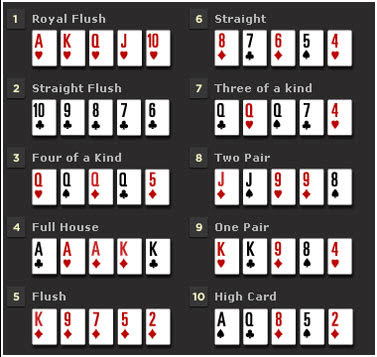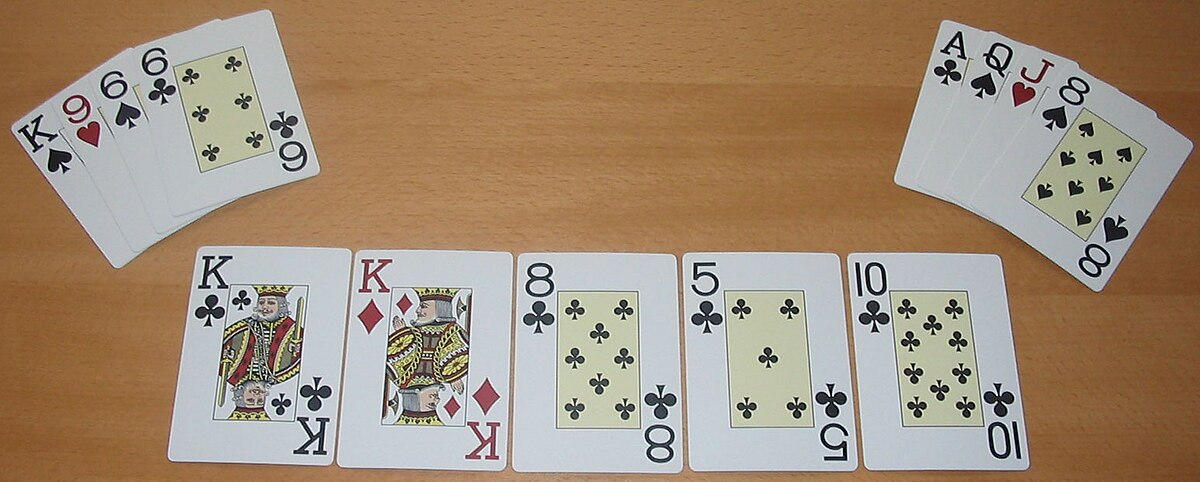Poker Rules Wiki
Posted By admin On 26/03/22Spearheaded by famed poker professional Marcel Luske of the Netherlands, the International Poker Federation (FIDPA) has done just that and compiled a set of rules that, if adopted internationally, would avoid the vast majority of disputes that can be seen in casinos or poker tournaments around the world. Jan 27, 2020 Omaha poker is a community poker game where players have to make their best 5-card poker hand using both face-down and face-up cards. Similar to Texas Hold’em, the community cards in Omaha poker are dealt in 3 stages, and players bet after each stage. In poker, players form sets of five playing cards, called hands, according to the rules of the game. Each hand has a rank, which is compared against the ranks of other hands participating in the showdown to decide who wins the pot.
No Poker laws are universally followed - there are many local customs and preferences - but the Poker laws on this site embrace the latest customs of the most expert games and are recommended for adoption. It is a tradition of Poker that any club or group of players may make special rules, called 'house rules,' to suit their personal preferences. Poker Basics and Hand Rankings. For those unfamiliar with poker rules and the game of Poker, along with others who might want a refresher, this is the most basic of basic poker. The various games are based on this. Poker is a game of five card hands dealt from a 52 card deck of standard playing cards. All poker hands consist of exactly five cards.
A poker run is an organized event in which participants, usually using motorcycles, all-terrain vehicles, boats, snowmobiles, horses, on foot or other means of transportation, must visit five to seven checkpoints, drawing a playing card at each one. The object is to have the best poker hand at the end of the run. Having the best hand and winning is purely a matter of chance. The event has a time limit, however the individual participants are not timed.
According to the Guinness Book of World Records, the record for the largest event was set in 2009 with 2,136 motorcyclists benefiting the Fallen Firefighter Survivors Foundation (FFSF).[1]
The record for the largest single venue event was set in 2012, with 586 motorcyclists raising money for Prostate Cancer research in Ottawa, Canada.[2]
Variations[edit]
Poker runs usually require a fee to enter and some for each additional hand; in some events a small part of the fee may go to funding the event, including the prizes, while the rest goes to the event's charity recipient or club treasury. In charity events usually most, if not all of the funds goes to the selected charity. Prizes, such as money, plaques, or merchandise donated by commercial sponsors of the event, are awarded for the best hand. Some runs will award smaller awards for lower hands or even the lowest hand.
Each checkpoint might offer food or entertainment, either covered by the entry fee or at additional cost. Each participant is responsible to maintain the integrity of their hand during the run. Hands are usually written down or marked with punched holes on a ticket, rather than assembled from actual cards given to the riders. The only requirement is that riders arrive at the final checkpoint by the time prizes are awarded, usually near the end of the day, typically at a party with food and refreshments. It might be required that participants collect all of the requisite number of cards, five or seven, or they might be allowed to miss checkpoints and use a hand with fewer cards, though the odds of a winning hand are much lower.
Transport[edit]
Although most events are on motorcycles, off-road vehicles, boats, or horses, events involving small aircraft, ATVs, bicycles, golf carts, snowmobiles,[3] skateboards,[4] running,[5] canoeing and kayaking,[6] and geocaching[7] have been held.
Dice run[edit]
A dice run is one variation, where instead of collecting cards, participants roll dice at each stop. The object is to have the highest score as determined by the sum of the dice rolls.
See also[edit]
Notes[edit]

- ^'Largest motorcycle Poker run - Guinness World Records Blog post - Home of the Longest, Shortest, Fastest, Tallest facts and feats'. Community.guinnessworldrecords.com. 2009-04-18. Archived from the original on 2009-05-09. Retrieved 2012-05-16.
- ^'Largest motorcycle poker run (single venue)'. 2012-11-06. Retrieved 2013-02-26.
- ^[1]Archived July 5, 2008, at the Wayback Machine
- ^'Poker Run', Silverfish Longboarding - The Longboard Skateboard Community - P - General Longboard Glossary, archived from the original on 12 December 2007, retrieved 2010-07-02
- ^[2]Archived August 16, 2009, at the Wayback Machine
- ^Waterloo-Cedar Falls Courier: Canoe/kayak poker run will benefit ill children
- ^Geocaching.com: First Annual Lillington Poker Run
References[edit]
External links[edit]
| Wikimedia Commons has media related to Motorcycle events. |


Five-card draw (also known as a Cantrell draw) is a pokervariant that is considered the simplest variant of poker, and is the basis for video poker. As a result, it is often the first variant learned by new players. It is commonly played in home games but rarely played in casino and tournament play. The variant is also offered by some online venues, although it is not as popular as other variants such as seven-card stud and Texas hold 'em.
Poker Rules Wikihow
Gameplay[edit]
In casino play the first betting round begins with the player to the left of the big blind, and subsequent rounds begin with the player to the dealer's left. Home games typically use an ante; the first betting round begins with the player to the dealer's left, and the second round begins with the player who opened the first round.
Play begins with each player being dealt five cards, one at a time, all face down. The remaining deck is placed aside, often protected by placing a chip or other marker on it. Players pick up the cards and hold them in their hands, being careful to keep them concealed from the other players, then a round of betting occurs.
If more than one player remains after the first round, the 'draw' phase begins. Each player specifies how many of their cards they wish to replace and discards them. The deck is retrieved, and each player is dealt in turn from the deck the same number of cards they discarded so that each player again has five cards.
A second 'after the draw' betting round occurs beginning with the player to the dealer's left or else beginning with the player who opened the first round (the latter is common when antes are used instead of blinds). This is followed by a showdown, if more than one player remains, in which the player with the best hand wins the pot.
House rules[edit]
A common 'house rule' in some places is that a player may not replace more than three cards, unless they draw four cards while keeping an ace (or wild card). This rule is useful for low-stakes social games where many players will stay for the draw, and will help avoid depletion of the deck. In more serious games such as those played in casinos it is unnecessary and generally not used. However, a rule used by many casinos is that a player is not allowed to draw five consecutive cards from the deck. In this case, if a player wishes to replace all five of their cards, that player is given four of them in turn, the other players are given their draws, and then the dealer returns to that player to give the fifth replacement card; if no other player draws it is necessary to deal a burn card first.
Another common house rule is that the bottom card of the deck is never given as a replacement, to avoid the possibility of someone who might have seen it during the deal using that information. If the deck is depleted during the draw before all players have received their replacements, the last players can receive cards chosen randomly from among those discarded by previous players. For example, if the last player to draw wants three replacements but there are only two cards remaining in the deck, the dealer gives the player the one top card he can give, then shuffles together the bottom card of the deck, the burn card, and the earlier players' discards (but not the player's own discards), and finally deals two more replacements to the last player.
List Of Poker Hands - Wikipedia
Sample deal[edit]
The sample deal is being played by four players as shown to the right with Alice dealing. All four players ante $1. Alice deals five cards to each player and places the deck aside.
Bob opens the betting round by betting $5. Carol folds, David calls, and Alice calls, closing the betting round.
Basic Poker Rules Wikipedia
Bob now declares that he wishes to replace three of his cards, so he removes those three cards from his hand and discards them. Alice retrieves the deck, deals a burn card, then deals three cards directly to Bob, who puts them in his hand. David discards one card, and Alice deals one card to him from the deck. Alice now discards three of her own cards, and replaces them with three from the top of the deck (Note: in a player-dealt casino game there is often a rule that the dealer must discard before picking up the deck, but this is a home game so we won't worry about such details).
Now a second betting round begins. Bob checks, David checks, Alice bets $10, Bob folds, David raises $16, and Alice calls, ending the second betting round and going directly into a showdown. David shows a flush, and Alice shows two pair, so David takes the pot.
Stripped deck variant[edit]
Five-card draw is sometimes played with a stripped deck. This variant is commonly known as 'seven-to-ace' or 'ace-to-seven' (abbreviated as A-7 or 7-A). It can be played by up to five players. When four or fewer players play, a normal 32-card deck without jokers, with ranks ranging from ace to seven, is used. With five players, the sixes are added to make a 36-card deck. The deck thus contains only eight or nine different card ranks, compared to 13 in a standard deck. This affects the probabilities of making specific hands, so a flush ranks above a full house and below four of a kind. Many smaller online poker rooms, such as Boss Media, spread the variant, although it is unheard of in land casinos.
Maths of Five-card draw[edit]
Zynga Poker Rules Wiki
- Pre-draw odds of getting each hand
Poker Rules Wiki
- Royal flush <0.001%
- Straight flush (not including royal flush) <0.002%
- Four of a kind 0.02%
- Full house 0.14%
- Flush (excluding royal flush and straight flush) 0.20%
- Straight (excluding royal flush and straight flush) 0.39%
- Three of a kind 2.11%
- Two pair 4.75%
- One pair 42.30%
- No pair / High card 50.10%